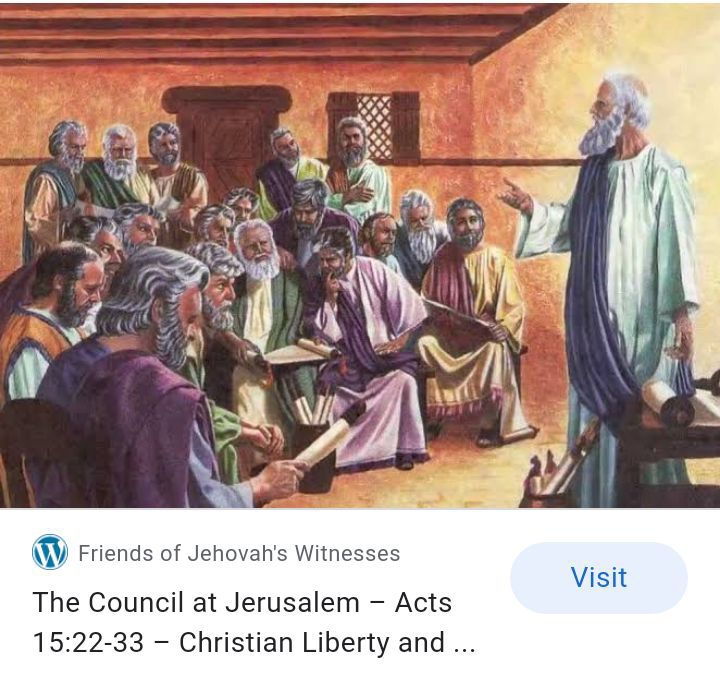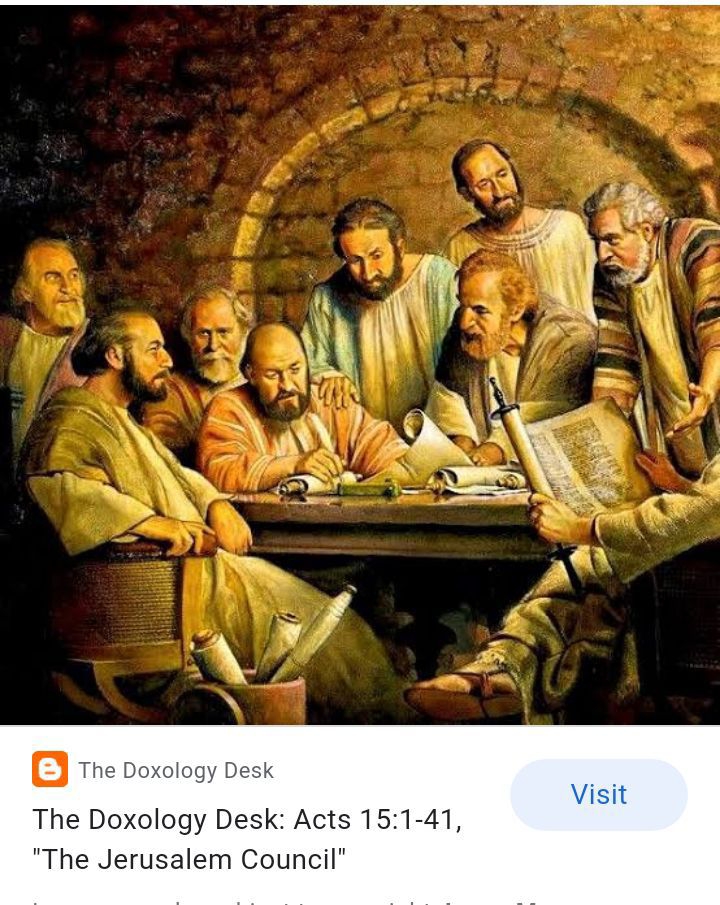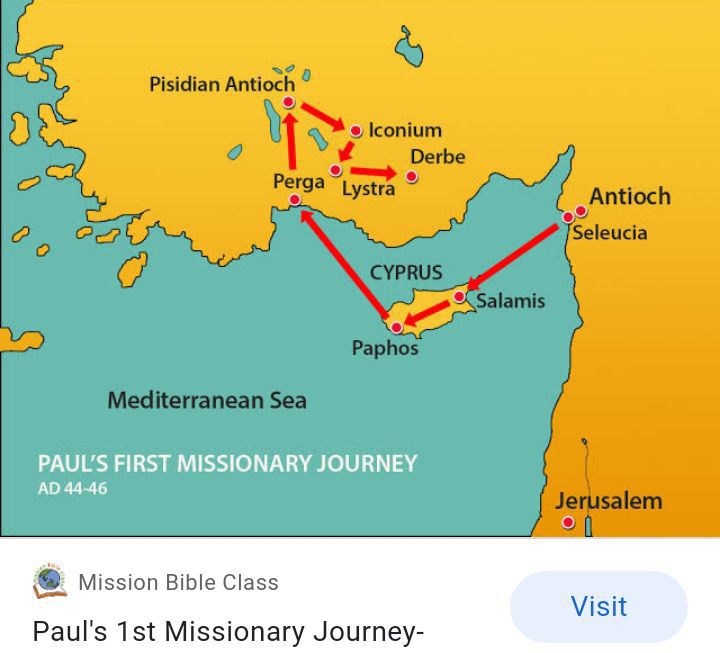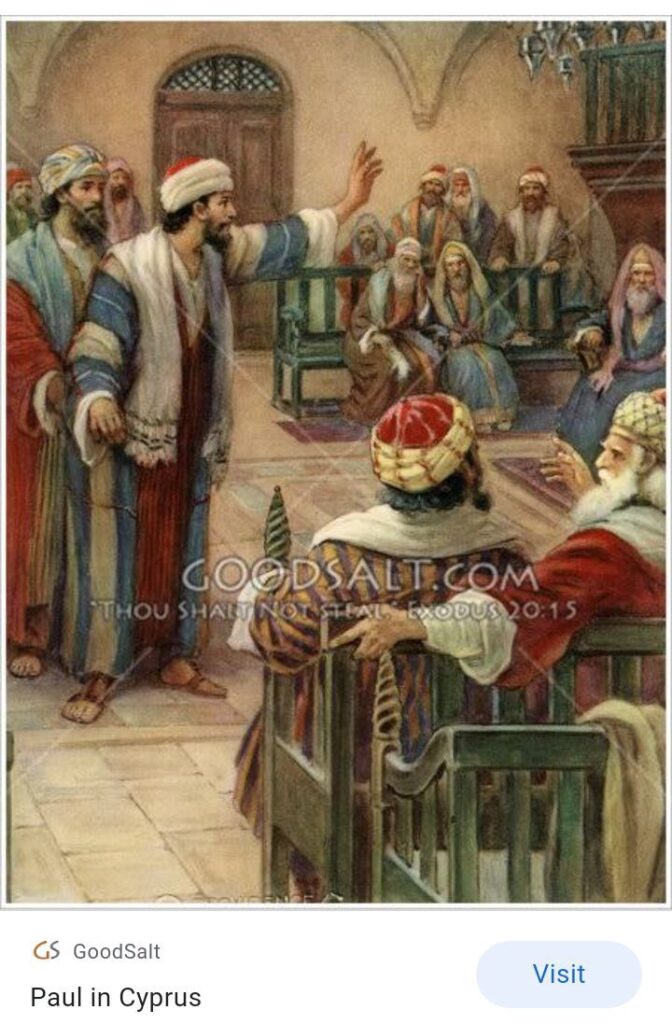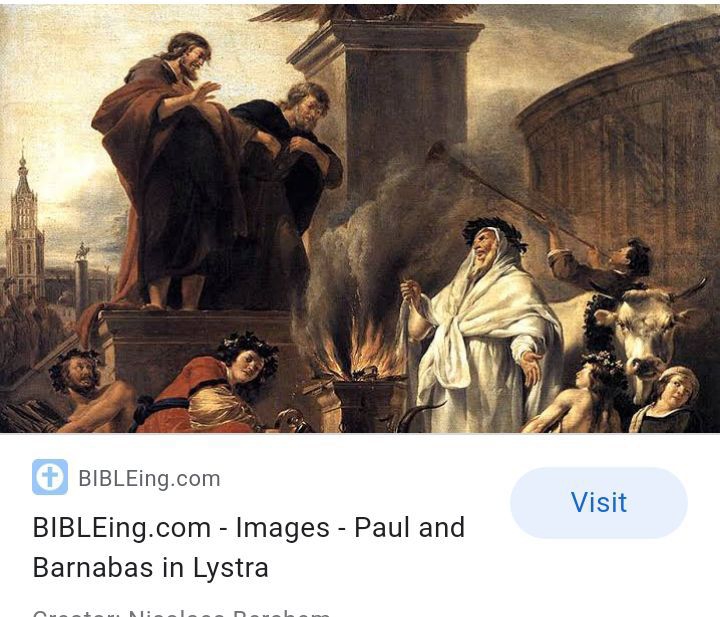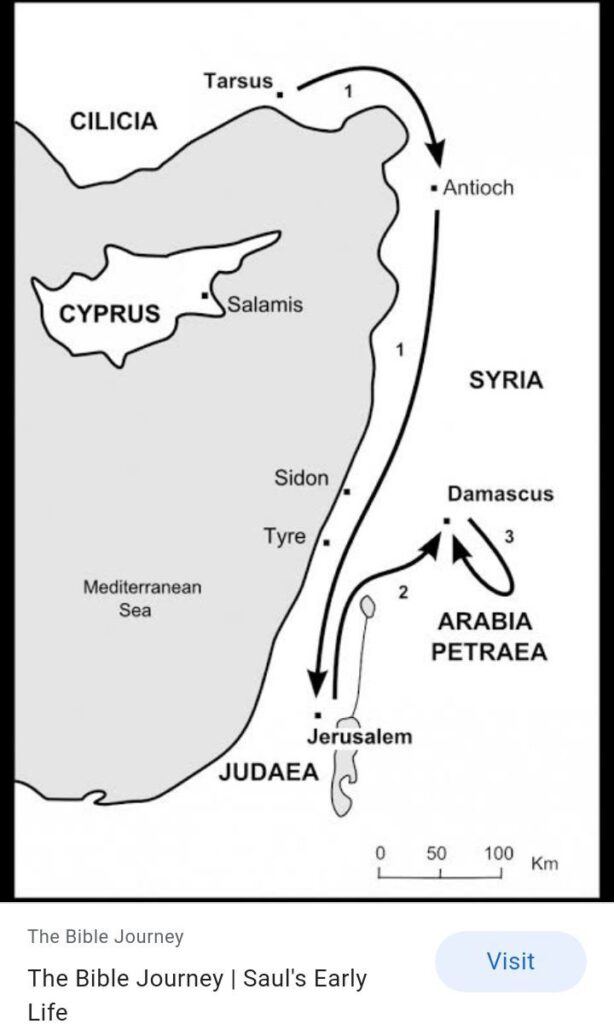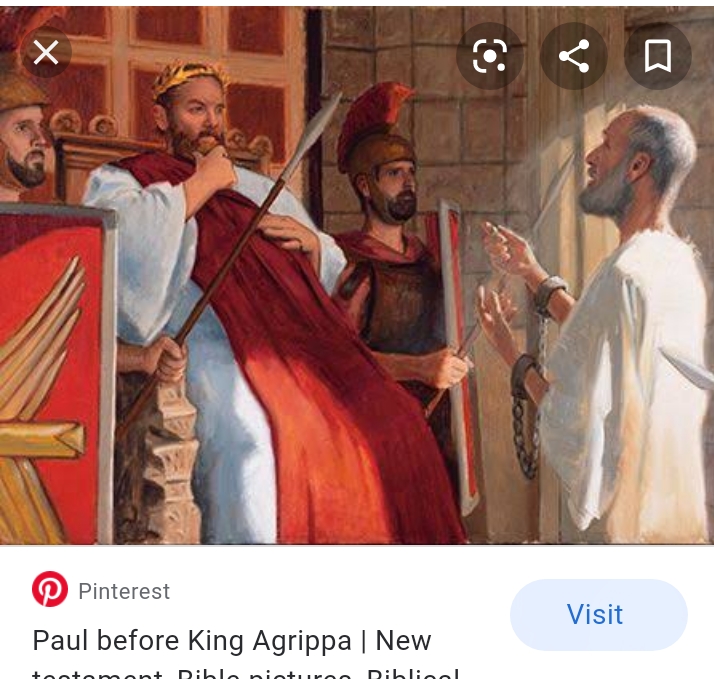Week 11…5th August, 2020
Hello students,
Trust you are doing great! Keep trusting God for He is ever faithful. This season shall soon pass away and we shall all be a alive to celebrate His faithfulness. Pls, submit your work as at when due. Do not be lazy in this lockdown. Stay safe.
Summary of Paul’s Second Missionary Journey (Acts 15:36 to 18:22).
On the first journey, Barnabas had been Paul’s main companion. On this second missionary journey, he chooses Silas for that role. Paul and Barnabas had intended to go together, but they disagreed about taking John Mark with them.
John had quit the first missionary journey early (Acts 13:13) apparently to Paul’s great displeasure. To resolve the matter, Barnabas took John Mark with him and they sailed to Cyprus, while Paul took Silas with him, and they started north over land.
- Paul and Silas left Syrian Antioch. They travel through Syria and into Cilicia (Acts 15:36-41).
- They worked in Derbe and Lystra, where Timothy was recruited to join them. They travel on to Iconium. In these cities they have success in strengthening the disciples and making new converts (Acts 16:1-5).
- They pass through the regions of Phrygia and Galatia because the Holy Spirit would not let them go to Asia. In Mysia the Spirit changed their plans again and sent them to Troas (Acts 16:6-8).
- They were now far out of the territory covered by the first journey. But they were to be called further yet. Paul received a vision calling him to Macedonia (Acts 16:9-12).
- In Philippi they convert Lydia (Acts 16:13-15)
6. They cured a slave girl of her evil spirit and are thrown into prison (Acts 16:16-24).
7. Their jailer is converted (Acts 16:25-34).
8. They are released from prison with some embarrassment to the authorities (Acts 16:35-40).
9. Next they go to Thessalonica, preach in the synagogue and make converts. But some Jews make trouble (Acts 17:1-9).
10. Paul and Silas are sent by night to Berea. Working in Berea, they find ready minds to receive the gospel. But the trouble makers arrive and Paul is taken to Athens to avoid them (Acts 17:10-15).
11. Paul’s sermon in Athens (Acts 17:16-34).
12. After Athens Paul went to work in Corinth, where he met Aquila and Priscilla. In Corinth, Silas and Timothy rejoined Paul (Acts 18:1-5).
13. In Corinth, some Jews make serious trouble again (Acts 18:6-17).
14. Paul sets sail to go back to Syria. From Corinth Paul went to Ephesus via Cenchrea. He stayed at Ephesus only a short time on that occasion (Acts 18:18-21).
15. He took a ship to Caesarea (south of Tyre and Ptolemais), visiting the church there, then went back to Syrian Antioch where his journey had begun (Acts 18:22).

Question:
Why did John Mark leave on the first missionary?
Week 10…. 29th July, 2020
Hello Students,
Trust you are doing great! Keep trusting God for He is ever faithful. This season shall soon pass away and we shall all be a alive to celebrate His faithfulness. Pls, submit your work as at when due. Do not be lazy in this lockdown. Stay safe.
THE JERUSALEM COUNCILThe Jerusalem Council was called to settle the controversy in the early Church.
Peter said that foreigners should not be required to be circumcised or obey the Law of Moses before becoming Christians.
a. Peter narrated how Cornelius and his relations were converted and received the Holy Spirit.
b. Peter said that Christians were saved by the grace of our Lord Jesus Christ and not by circumcision or the Law of Moses.
Paul and Barnabas also told how God called them to preach to, and heal the Gentilies.
a. They converted the Gentilies without imposing circumcision and the Law of Moses on them.
James said that the Gentiles should not be required to follow all the Jewish customs and Laws of Moses.
a. He said that the Gentiles should only abstain from meat sacrificed to idols, from blood, strangled meat and unchasity.
b. The decision was written in a letter and sent to the Gentiles.
c. The letter was sent through Paul, Barnabas, Judas and Silas.
Lessons learnt:
-The Church settled its dispute in a friendly and objective manner and this brought peace and unity.
-God wants you all to pray to Him through Jesus to use the Holy Spirit your disputes peacefully, like the Jerusalem Council did.
Answer this question:
Give four decisions that were arrived at during the Jerusalem council.
Week 10…22nd July, 2020
Hello Students
Trust you are doing great! Keep trusting God for He is ever faithful. This season shall soon pass away and we shall all be a alive to celebrate His faithfulness. Pls, submit your work as at when due. Do not be lazy in this lockdown. Stay safe.
MISSIONARY ACTIVITIES OF PAUL
First Missionary Journey ( Acts 13 and 14)
- Paul and Barnabas went on their first missionary journey under the guidance and protection of the Holy spirit.
2.They preached through the Island of Cyrus. - At Paphos, they preached to the ruler, Sergius Paulus.
a. Elymas the magician and false priest, obstructed the conversion of the ruler.
b. Paul, with the help of the Holy Spirit, conquered Elymas by making him blind.
c. The ruler then believed and was converted.
- At Lystra, the apostles preached and healed a cripple who had faith with the help of the Holy Spirit.
a. The people took the apostles to be gods and called Barnabas, Zeus and Paul, Mercury.
b. The people wanted to sacrifice to the apostles but the apostles prevented them from doing so.
c. The apostles appealed to the people to turn to the living God who supplied all their needs.
d. Jews from Pisidia and Iconium turned the people of Lystra against the apostles.
e. Paul Paul was stoned and left to die, but he recovered and returned to the city.
- . Paul and Barnabas went to Derbe before retracting their steps to Antioch after appointing elders for all the Churches they established.
- The spread of the Gospel is beset by obstacles.
- God wants you to pray to Him through Jesus to use the Holy Spirit to aid you spread the Gospel in spire if these obstacles.
Question:
THE JERUSALEM COUNCIL - The Jerusalem Council was called to settle the controversy in the early Church.
- Peter said that foreigners should not be required to be circumcised or obey the Law of Moses before becoming Christians.
a. Peter narrated how Cornelius and his relations were converted and received the Holy Spirit.
b. Peter said that Christians were saved by the grace of our Lord Jesus Christ and not by circumcision or the Law of Moses. - Paul and Barnabas also told how God called them to preach to, and heal the Gentilies.
a. They converted the Gentilies without imposing circumcision and the Law of Moses on them. - James said that the Gentiles should not be required to follow all the Jewish customs and Laws of Moses.
a. He said that the Gentiles should only abstain from meat sacrificed to idols, from blood, strangled meat and unchasity.
b. The decision was written in a letter and sent to the Gentiles.
c. The letter was sent through Paul, Barnabas, Judas and Silas. - The Church settled its dispute in a friendly and objective manner and this brought peace and unity.
- God wants you all to pray to Him through Jesus to use the Holy Spirit your disputes peacefully, like the Jerusalem Council did.
Answer this questions:
Give names of the places visited by Paul and Barnabas in the first missionary journey.
Week 9…15th July, 2020
Hello Students
Trust you are doing great! Keep trusting God for He is ever faithful. This season shall soon pass away and we shall all be a alive to celebrate His faithfulness. Pls, submit your work as at when due. Do not be lazy in this lockdown. Stay safe.
PAUL’S EARLY LIFE AND CONVERSION
Paul’s Nativity and Education (Acts 22:1-4, 26-30)
Paul was born in Tarsus soon after the birth of Jesus Christ.
Paul was his Roman name and Saul, his Jewish name.
a. He could speak Hebrew, Greek and Aramaic.
b. He was brought up in the fear of God.
c. At twelve, he attended the Synagogue school and graduated as the Son of the Law.
d. He became a Pharisee, like his father was.
e. He continued his education in Jerusalem under Gamaliel and successfully graduated .
f. He worked as a tentmaker in Tarsus.
g. He returned to Jerusalem when the apostles were preaching a bout the death and resurrection of Jesus Christ, the Messiah.
h. He was among the Jews who did not believe that Jesus was the Messiah and, therefore opposed the Christians.
I. He was the ring leader of those who stoned Stephen to death.
j. He was a successful young man because he was obedient, respectful and hardworking.
Saul’s Conversion
Saul asked for permission from the high priest to arrest Christians who had fled to Damascus from Jerusalem.
a. A bright light from heaven blinded Him as he was nearing Damascus, and he fell from his horse.
b. Jesus asked Saul why he was persecuting him; and that he (Saul) should enter Damascus and wait further instructions.
c. Saul’s companions were silent and afraid as they heard Jesus’ voice but didn’t see anyone.
d. Saul’s companions took him to Damascus and he was there for three days without food , water and sight.
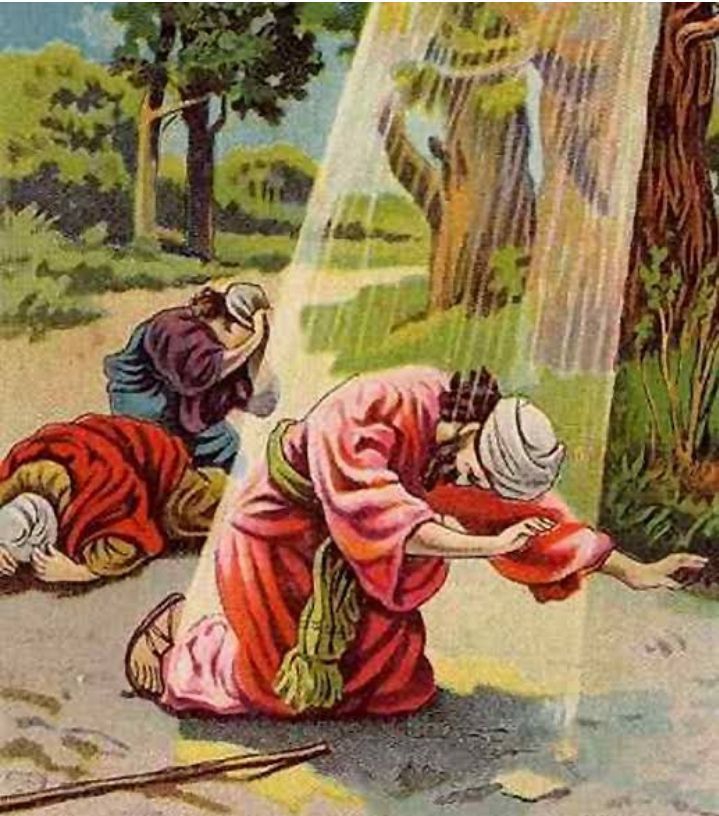
- Jesus asked Ananias to convert Saul and help him regain his sight.
- Ananias protested because of Saul’s persecution of Christians.
- Jesus said Saul was his chosen instrument to carry the Gospel to both Jews and Gentiles. Ananias obeyed and helped Saul regain his sight.
- Saul then baptized and he received the Holy Spirit.
- The conversion of Paul made him a changed man.
- He stopped persecuting the Christians and instead devoted his life to Christ.
- Paul’s faithful response to Gods call is similar to that of Abraham, Moses the disciples and some present day Christians.
- God wants you to be helped by Jesus to lead changed lives for the better like Paul did.
Question:
Give the privileges that Paul enjoyed as a Roman citizen
Week 8… 8th July, 2020
Hello Students,
Trust you are doing great! Keep trusting God for He is ever faithful. This season shall soon pass away and we shall all be a alive to celebrate His faithfulness. Pls, submit your work as at when due. Do not be lazy in this lockdown. Stay safe.
PEACEFUL CO- EXISTENCE
- Peaceful co- existence is living together in peace with other people.
a. Abraham shared the land to live in peace with Lot
b. Isaac exercised patience and forbearance to live in peace with the Philistines.
c. Esau reconciled with, and forgave Jacob to live peacefully with him.
d. Philemon forgave Onesimus, after his confession and lived with him in peace.
e. God wants all of us to pray to Him through Jesus Christ to use the Holy Spirit help us to continue to promote peaceful co- existence with all those you come into contact with. - We cannot avoid co- existing with others.
a. There are problems arising from lack if peaceful co-existence.
b. We should show the desire for peaceful co-existence.
c. God wants you to pray to Jesus to allow the Holy Spirit to help tiu work for peaceful co-existence. - Christians and Muslims have common origins of their faith in Abraham:
a. Jesus Christ founded Christianity
b. Prophet Muhammad founded Islam
Christians and Muslims share three common beliefs:
- The creation of the world
- The separation between God and man
- Reconciliation with Him.
d. Christians and Muslims must work towards peaceful co-existence by showing more:
i. Understanding;
ii. Sympathy and empathy
iii. Respect and tolerance for one another.
e. God wants all Christians and Muslins not only in Nigeria but the world to work towards peaceful co-existence by living together in peace and unity.
Questions:
- With three points, describe what happens when there is no peaceful co-existence.
Week 7….. 1st July, 2020
Hi Students,
Trust you are doing great! Keep trusting God for He is ever faithful. This season shall soon pass away and we shall all be a alive to celebrate His faithfulness. Pls, submit your work as at when due. Do not be lazy in this lockdown. Stay safe.
CHRISTIANS LIVING AMONG NON- CHRISTIANS
A community is made up of a group of people living in an area or neighborhood. As Christians we live in the community with others who are not Christians.
Christians Living in the Community(1 Pet.2:9-25)
- Christians are the chosen race, who are helped by the Holy Spirit to comport themselves well among non christian by:
a. submitting to the civil authorities.
b. doing what is right and putting to shame the ignorance of foolish men.
c. not using their freedom as an excuse as an excuse to do what is wrong.
d. being loyal servants to their masters.
e. following good examples of Jesus as the suffering servant. - Christians are the ‘salt of the earth’ and the ‘light of the world’ who should lead exemplary lives among non-Christians by:
a. preserving and improving the quality of life in the society according to the teachings of Jesus Christ. b. leading them to greater light in Christ by letting our light of good works shine before them. c. God wants all of us to pray to Jesus to allow the Holy Spirit help us behave as good Christians among non Christians.
- Persecution is suffering or being killed for what you stand for.
a. Christians are likely to face persecution for standing up for Jesus in doing what us right in God’s sight.
b. According to Peter, persecution is:
(i) a trial of our faith
(ii) sharing on the suffering of Jesus .
c. According to James, God will give the crown if life to all Christians who endure persecution. - God wants all of us to pray to Jesus to help us be positive in your attitude to persecution so as to be rewarded with a crown of life.
Week 6…… 24the June, 2020
Hello Students,
Trust you are doing great! Keep trusting God for He is ever faithful. This season shall soon pass away and we shall all be a alive to celebrate His faithfulness. Pls, submit your work as at when due. Do not be lazy in this lockdown. Stay safe.
TEACHINGS THAT WILL FOSTER UNITY
(i) Faith and Works ( James 1:22-27)
Faith in the teaching of James represents the Christian moral teachings of good conduct as revealed to us in the teachings of Jesus Christ. Works means putting the moral teachings of Jesus bin to practice in the Christian life.
a. A true Christian is one who combines faith and works
b. The true religious man is one who controls his tongue
c. True religion means visiting orphans, widows and being holy
The significance is that God wants all Christians to combine faith and works with the help of the Holy Spirit.
(ii) Humility
A humble person is obedient, polite and patient.
Paul’s teaching on Humility (Philippians 2:1-11)
a. Paul warned Christians to shun selfishness and pride and be humble
b. Paul said Jesus is our best example of humility which we should follow
c. God exalted Jesus for his humility
Peter’s teaching in Humility (1 Peter 5:5-11)
According to Peter:
a. God opposes the proud but gives grace to the humble
b. God will exalt all humble Christians
c. Christians should demonstrate humility by resisting the devil at all cost
The significance is that God wants you to be humble in all they you think, say and do with the help of the Holy Spirit.
(iii) Impartiality (James 2:1-13)
Partiality is discriminating against others as a result if their race, sex, religion or political belief.
a. James warns Christians to shun partiality band practice impartiality
b. The poor should not be discriminated against because though poor, they have been chosen by God and made rich in faith
c. The rich they Favour are the ones that oppress them, and blaspheme the good name of the Lord
The significance is that God wants all of us to to reject partiality and practice impartiality with the help if the Holy Spirit.
(iv) Forgiveness ( Galatians 6:1-2, Philemon 1-25)
To forgive is to pardon a person for an offence committed.
a. Paul advised the Galatians to be gentle with a member who had been forgiven
b. Paul encouraged Philemon to forgive his runaway slave, Onesimus
The significance are:
- Forgiveness brings about social equality
- Forgiveness promotes peace, love, unity, friendship and happiness in the home, school and in the community
- God wants us to promote forgiveness so as to bring about peace, love, unity, friendship and happiness in the home, school and in the community.
Answer the following questions:
- Give the ways through which we can foster unity
- Read Philemon and highlight the content of the book on forgiveness.
Correction for week 5
- Giving is an act of charity.
- Forms of Giving: – giving to the poor, needy, needy, orphans and widows, – sacrificing our time, – taking active part in taking care of our environment, – providing free LA our in developmental projects etc.
Week 5……17th June, 2020
Hi Students,
Trust you are doing great! Keep trusting God for He is ever faithful. This season shall soon pass away and we shall all be a alive to celebrate His faithfulness. Pls, submit your work as at when due. Do not be lazy in this lockdown. Stay safe.
Note: Apart from your submission online, always write your answers in your CRS note as well so that we can make reference to the corrections when we resume.
Christian Giving
Giving is an act of charity . Giving may take the form of:
a. donating money for a worthy cause,
b. sacrificing our time and energy for a worthy cause;
c. taking active part in cleaning our environment.
(Philippians 4: 14-20) Paul taught about Christian Giving in his letter to the Philippians.
a. The Philippians donated money for his upkeep while in prison in Rome. The Philippians sent the gifts through Epaphroditus.
b. Paul encouraged all Christians to give for a worthy cause, like the Philippians did. c. Paul said everyone would be rewarded according to his manner of giving and that God always help those who give generously.
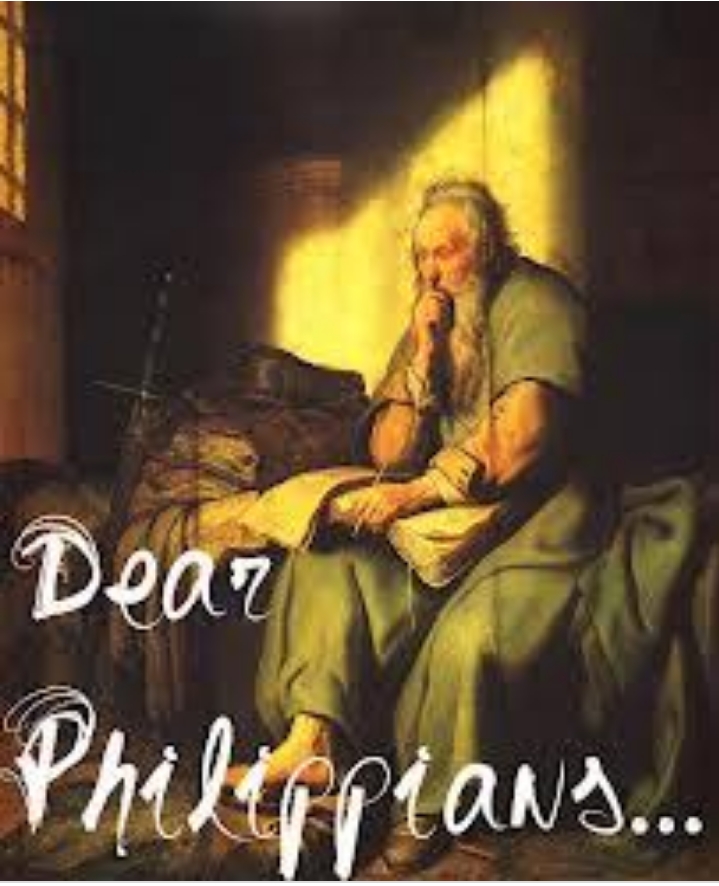
Paul wrote to the Philippians on virtues of Christian Giving following the gifts they sent to him through Epaphroditus while in prison in Rome
(2 Corinthians 8:3-5). Paul encouraged the Corinthians to abide by their agreement to donate to the suffering Christians
in Jerusalem.
a. He used the example of the Macedonian Churches and Jesus Christ to encourage them to give generously
b. Paul Said those who give abundantly will receive abundant reward from God.
c. Paul said we should give cheerfully because God loves the cheerful giver.
Significance of Paul’s teaching on Christian Giving:
-By extolling the virtues of Christian Giving, Paul was in effect calling upon all Christians today to promote Church unity by manifesting true sense of giving in their various communities.
-As Christians, we can donate money to the underprivileged, aged and the physically challenged in the society.
-Christian giving can take the form of supporting the work of evangelism.
Answer this questions: 1.What is ‘Giving’? 2.Mention three forms of Giving.
Correction for 4th week
- Paul defended himself before Agrippa that:
-He was had been a strict Jew
-Belong to the strictest party of the Pharisee who were string believers in the resurrection from the dead.
-He was on trial because of his belief
-He defended his religion by persecuting the Christians in Jerusalem
-He was converted to Christianity on his way to persecute Christians in Damascus.
-He preach in obedience to the divine voice
-That it was in relationship with the Gentiles that the Jews had seized him in Jerusalem.
2. Significance of Paul’s trial before the Roman Governors
- Christians have the right to speak in self-defense
- People in authority should not allow themselves to be influenced by others.
Week 4…. 10th June, 2020
Hi Students,
Trust you are doing great! Keep trusting God for He is ever faithful. This season shall soon pass away and we shall all be a alive to celebrate His faithfulness. Pls, submit your work as at when due. Do not be lazy in this lockdown. Stay safe.
Note: Apart from your submission online, always write your answers in your CRS note as well so that we can make reference to the corrections when we resume.
Paul’s trial before Agrippa (Acts 25:23-27; 26:1-16)
King Herod Agrippa visited caesarea and Festus told him about Paul. King Agrippa decide to listen to Paul himself, and Paul was brought before him the next day .
Festus presented Paul’s case, stressing that he was innocent. Paul spoke of his early life as a strict Jew and a member of the Pharisees. He said he was on trial because of his belief in the resurrection from the dead. He said he was formerly a persecutor of the Christians and was converted to Christianity when he went to persecute those Christians who fled Jerusalem to Damascus.
Paul spoke of his preaching to the Jews and then the Gentiles
h. He said it was because of his relationship with the Gentiles that the Jews wanted to kill him. He said the suffering and resurrection of Jesus Christ had been prophesied.
Festus accused Paul of being mad for talking about the resurrection from the dead but King Agrippa was convinced of the truth of the resurrection.
The King, the governor and their counsellors agreed that Paul was innocent and would have been released if he had not appealed to Caesar.
Religious and Moral lessons
- Just and reasonable authorities defend the right of their citizens.
- God wants you to establish good government that will be just and reasonable to her citizens.
- Answer these questions:
- Describe the content of Paul’s Defense before Agrippa
- Give two significance of Paul’s trial before the Roman Governors.
Correction
- Paul appealed to Caesar in Roman because he was not getting fair trial. Though the governors knew he was innocent. Paul had to exercise his right as a Roman citizen to appeal to Caesar so that he could get justice.
- Three privileges that Paul enjoyed as a Roman citizen:
- No molestation anjd flogging when arrested
- Fair trial
- Opportunity to appeal to the Emperor if the trial was not fair.
Week 3…..3rd June, 2020
Hello students,
Trust you are doing great! Keep trusting God for He is ever faithful. This season shall soon pass away and we shall all be a alive to celebrate His faithfulness. Pls, submit your work as at when due. Do not be lazy in this lockdown. Stay safe.
PAUL BEFORE THE ROMAN GOVERNORS
Paul’s trial before Felix (Acts 24: 10-23)
1. Paul appeared before Felix to defend himself against charges by the Jews.
a. The Jews charged Paul with rebellion and for being the ringleader of the Christians who profaned the Temple.
b. Paul denied the charges as false.
c. Paul claimed to be a Christians but obedient to the Jewish Law and Custom.
d. Paul said it was because of his belief in the resurrection from the dead that he was on trial.
e. Felix kept Paul in prison because he (Paul) did not bribe him.
f. Paul remained in prison till the arrival of the next governor, Porcius Festus.
Significance of Paul before Felix:
* Paul’s defence shows the right of the Christians to defend their faith before civil authorities.
* God wants you to defend your faith in Jesus Christ before the authorities.

Paul’s trial before Festus ( Acts25:1-21)
- Festus visited Jerusalem and the Jews persuaded him to try Paul there.
a. Festus said he would try Paul in Caesarea.
b. The Jews accused Paul before Festus but could not prove anything.
c. Paul declared the charges false.
d. Festus suggested that Paul be tried in Jerusalem in order to please the Jews.
e. Paul refused because he would not get a fair trial; or might be killed on the way.
f. Paul appealed to the Roman Emperor as demanded by Law.
g. Festus consulted his advisers and agreed that the Emperor should try Paul. Significance of Paul before Festus: i. The trial revealed the possible weaknesses of the civil authority. ii. God wants you to to uphold human Rights by ensuring justice at all times.
Attempt the following questions:
1. State why Paul appealed to Caesar in Rome.
2. Highlight the Roman citizenship that Paul enjoyed.
Corrections on Paul and his trials
- Accusations made against Paul:
i. Taking Greek/ foreigner into the temple.
ii. Being an Egyptian ringleader.
iii. Speaking against the temple and the law of Moses.
iv. Preaching against Judaism - The disagreement between the Pharisees and the Sadducees was as a result of the Pharisees who believed in the resurrection from the dead that supported Paul and the Sadducees who did not believe. The Scribes who supported the Pharisees declared Paul innocent and this led to violence and Paul was rescued by the Roman soldiers.
Hello students,
Trust you are doing great! Keep trusting God for He is ever faithful. This season shall soon pass away and we shall all be a alive to celebrate His faithfulness. Pls, submit your work as at when due. Do not be lazy in this lockdown. Stay safe.
Week 2 Lesson 1
PAUL AND HIS TRIALS (Acts 21:17-40)
1. Paul arrived in Jerusalem and gave account of his missionary activities. He was:
a. told of the accusations made against him by some Jewish Christian.
b. advised to fulfill a Jewish vow to clear himself
- Paul was accused of taking a Greek into the temple
- The Jews wanted to kill him because of the accusations made against him. Paul was:
a. rescued by the Roman soldiers
b. accused of being an Egyptian ringleader, but he denied it.
c. brought before the Jewish Council to defend himself - Paul had a problem with the High Priest.
a. Paul said that it was in respect to the resurrection from the dead that he was on trial.
b. This brought disagreement between the Pharisees who believed in the resurrection from the dead and the Sadducees who did not believe.
c. The Scribes who supported the Pharisees declared Paul innocent.
d. This led to violence and Paul was rescued by the Roman soldiers.

Paul’s trial in Jerusalem
Answer the following questions.
1. Give two accusations made against Paul by the Jewish Council
- Describe the disagreement between the Pharisees and Sadducees in relation to Paul.
Correction
No Fields Found.- New Religious movements formed by Nigerians are:- i. Christ Army Church- by followers of Garrick Sokari Braid in 1918. ii. Cherubim and Seraphim Church- Moses Orimolade, 1925. iii. Church of the Lord (Aladura)- Josiah Ositelu, 1930
- iv. Christ Apostolic Church ( CAC)- Joseph Ayo Babalola, 1941. v. Celestial Church of Christ ( CCC)- S.B.J. Oshoffa, 1947.
- Factors responsible for the rapid growth of Pentecostal churches: – Crusade/Revival, Vigils, Prayer meetings, House fellowship, Healing, Adopting African form of worship.
The growth of the Church
Answer the following questions:
1.Mention 2 new religious movements formed by Nigerians and give 2 examples each.
2.Mention 4 factors responsible for the rapid growth of Pentecostal church.
No Fields Found.